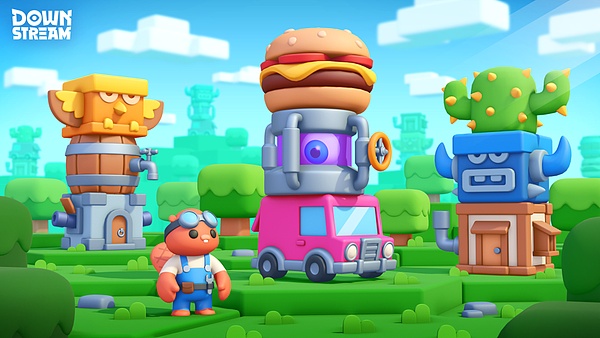Note: David Amor is the CEO of Playmint, a UK-based Web3 game developer.
In my career, I have developed over a hundred games across PC, console, handheld, and mobile devices. I love the fact that the gaming industry rarely stays the same for long. A VC friend told me that investors think of hedgehogs, who focus on one specific thing during their careers, while foxes jump to anything they find interesting, and I undoubtedly fall into the latter category.
In 2021, we founded Playmint to build fully on-chain games, which are games where the logic, state, and assets are all stored on the blockchain. Of the approximately 1,000 Web3 games being built, about 30 are fully on-chain, and I have been asked more than once why I do this, as blockchains are certainly not designed to be game servers.
In 2022, we’ve been working on Downstream, a fully on-chain MMO that has composability built into the game design. Specifically, it allows anyone to permissionlessly add smart contracts, thereby extending game functionality.
This is a game that aspires to be an autonomous world, which I think is the most interesting idea in the gaming industry in years, but has been largely ignored by all but a small group of passionate on-chain game developers.
For those outside of our bubble, I often get cynical reactions when I put blockchain and gaming in the same sentence, but the on-chain gaming community is one of the developers using blockchain as a decentralized technology, rather than a technology to support crypto-flavored capitalism. Decentralization opens up a whole host of new possibilities for the gaming industry, and to me, autonomous worlds are by far the most interesting one.
Most digital worlds are owned and operated by the companies that make them. A simple example is Blizzard managing World of Warcraft, they run the game world in real time, creating new content, running servers, making adjustments, banning players, managing the economy, etc. Blizzard is the administrator of World of Warcraft, they are the gods.
The human world we live in uses a different model. If there is a god, it must be a god with a very light touch. All humans are subject to the same set of physics. What you can do as a human is influenced by social and economic factors, not by gods or administrators deciding what you can do. What you can do in the human world is subject to the laws of physics and social consensus.
By using decentralized technology, the same model can be created digitally. We have created an MMO that will live long after I die because it lives on a blockchain, not on a server that we need to pay a monthly bill for. It has "digital laws of physics", "digital laws of physics" that determine what you can do in the world, and these digital laws of physics are immutable. So it is a game world that exists forever, and the rules will never change.

People in that world (including us) can add code to expand the functionality of the game without permission. This could be new quests, enemies to fight, a tribe system, a marketplace, gameplay features. Or anything else that is deemed useful or interesting, as long as it follows the underlying laws of digital physics, it works.
If this sounds like mods, then a fundamental difference is that mods break the player experience, i.e. different players end up with different experiences. Autonomous worlds let players introduce new experiences and features in a shared world that, like our human world, evolves as players add new things they want to see.
No need to pester Blizzard to add features to the game; no worrying about servers being shut down due to expired licensing agreements; the rules of the game are set in code forever and immutably; and in-game censorship is managed by social consensus.
It's an autonomous world. Building it involved solving a lot of new technical and creative problems, and the results are pretty low-fi right now, but it opens the door to a new type of gaming experience at a time when the industry could use some new ideas.
Original link: https://www.blockchaingamer.biz/features/opinions/26579/playmint-onchain-autonomous-worlds-downstream/
 JinseFinance
JinseFinance
 JinseFinance
JinseFinance JinseFinance
JinseFinance Miyuki
Miyuki decrypt
decrypt Medium
Medium Vitalik
Vitalik
 Cointelegraph
Cointelegraph Ftftx
Ftftx Cointelegraph
Cointelegraph